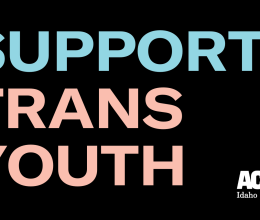
BOISE – Yesterday the Ninth Circuit federal court of appeals heard mootness arguments in Hecox v Little, the challenge to Idaho’s ban on transgender student participation in school sports. The focus was on whether the lawsuit is live and should proceed, given Lindsay Hecox withdrew from school before reenrolling.
Aadika Singh, ACLU of Idaho legal director, had the following reaction:
“We’re on the right side of history and the right side of the law: this case is clearly not moot and Lindsay should have the right to continue playing women’s club soccer and try out for the women’s cross-country team. Both of those opportunities are possible for Lindsay because our litigation has preliminarily blocked enforcement of this unconstitutional law, HB 500.”
During oral argument, when defendants for the State of Idaho and the Alliance Defending Freedom suggested that Lindsay Hecox’s case was moot because her interest in challenging the Idaho law is speculative, Judge Kleinfeld stated, “this is not a someday maybe type of case.” Judge Gould asked, “why does [Lindsay] have to show more than a genuine and plausible intent” to try out for the women’s cross-country team?
Last July, federal district court judge David Nye ruled that the lawsuit is not moot, meaning the case may proceed while the law remains blocked. The state of Idaho appealed that ruling, and that appeal was heard yesterday. A decision from the Ninth Circuit court of appeals is expected within several months.
The lawsuit was filed by the American Civil Liberties Union and the ACLU of Idaho, Legal Voice, and Cooley LLP on behalf of Lindsay Hecox—a student at Boise State University—and Jane Doe—a Boise High School student who is no longer a part of the case.






